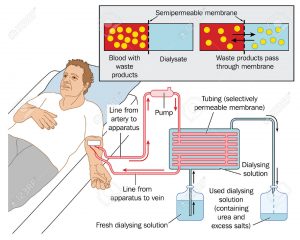When the kidneys are healthy, they cleanse their blood. They also produce hormones that keep your bones strong and your blood healthy. When the kidneys fail, treatment is needed to replace the work they performed. Unless you receive a kidney transplant, you will need a treatment called dialysis.
Dialysis is the technique that partially replaces the function of the kidneys, such as the depurative and normalizing function of the fluid and the composition of the blood. To do this, a membrane is used that contacts the blood, which acts as a filter through which blood filtration occurs imitating what the kidneys would do. The functions of formation of Erythropoietin and production of active Vitamin D do not carry them out and therefore this treatment must be added.
There are two types of dialysis, peritoneal dialysis, and hemodialysis.
The Peritoneal Dialysis is the one that is performed in the peritoneal cavity and uses as a filter the natural peritoneal membrane that surrounds the entire cavity. So that the purification of the blood can be carried out, a special liquid (dialysis fluid) that is periodically replaced is introduced through a soft silicone tube into the peritoneal cavity. It is a simple technique that is performed at home (it is a home dialysis option).
The Haemodialysis, it is the one that uses the blood of the patient, making it pass through an artificial filter on the outside and it is at the level of this filter where the depurative and normalizing function of the liquid and composition of the blood is performed. It is a technique that is performed primarily in hospital units or in dialysis centre in Delhi, although home hemodialysis treatment is currently also being developed.
What are the differences between both types of dialysis?
Broadly speaking, we could say that both techniques are superimposable in their function of partially replacing renal function. Peritoneal dialysis is performed at home and it is the patient himself who performs after a short period of guidance by dialysis specialist in Delhi, is continuous throughout the day and therefore more physiological and above all, allows the patient to perform their freedom more freely. usual social and work activity.
Haemodialysis is usually performed in hospital units or dialysis centre in Delhi, usually 3 times a week (in some it is daily and shorter) every other day and at fixed pre-established times, this often prevents reconciliation with the labour and social activity, in addition to the fact that being an intermittent technique makes it less physiological by more abrupt changes. Nowadays, home hemodialysis programs are being developed that overcome these problems.


